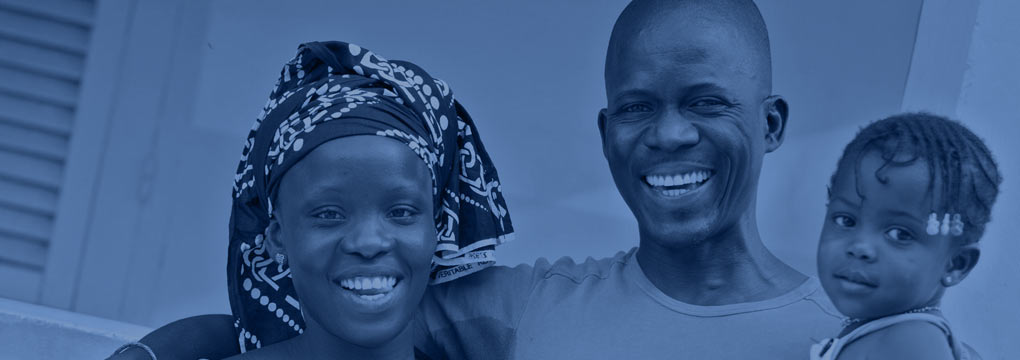The Health Policy Project ended in 2016. Work continued under Health Policy Plus (HP+) until 2022.
Repositioning Family Planning

Diana Mtazlkawa
Overview
In many countries, long-standing government commitments to make voluntary family planning services universally available have not been realized. While use of modern contraceptives is increasing, existing sources of family planning services and information remain inadequate to meet the growing demand. More than 200 million women in developing countries want to space or limit future births but are not using modern contraceptive methods. Many of these women live in sub-Saharan Africa, where unmet need for family planning is highest.
In 2001, the United States Agency for International Development (USAID), the World Health Organization, and several other donors began working with national governments in sub-Saharan Africa on an initiative called Repositioning Family Planning. The goal is to mobilize political commitment to strengthen family planning programs in this region to ensure that modern contraceptive methods are available to all who want them. The initiative emphasizes: (1) increasing political commitment and funding; (2) strengthening coordination among national leaders, government agencies, the private sector, and donors; (3) allocating resources for maximum impact.
The 2012 Summit on Family Planning, held in London, built further momentum to the Repositioning Family Planning initiative by encouraging donors, national governments, and civil society to make concrete commitments to support family planning programs.
What We Do
The Health Policy Project (HPP) works closely with key leaders and decisionmakers to strengthen support for family planning programs in low- and middle-income countries. Building on its long-term ties and broad experience in policy work, HPP assists key stakeholders to make the case for greater attention to family planning as an intervention with multiple benefits for women’s and children’s health, family wellbeing, and community stability. We
- Build the capacity of key organizations and stakeholders to identify and address policy barriers that limit access to family planning services and information, especially to under-served groups
- Support advocacy for increased funding for family planning by ensuring that advocates have accurate data and can communicate key messages effectively
- Provide tools to enable local specialists to estimate the costs associated with policy changes and assess alternative strategies to expand access to modern contraception
- Assist local organizations to set up systems to monitor government commitments and expenditures and ensure accountability and transparency
- Strengthen coordination among government, civil society, and communities to promote efficient use of available funds and personnel
By expanding access to affordable, high-quality family planning, governments can vastly improve the health and lives of millions of women, girls, infants, and families.
Publications and Resources
Repositioning Family Planning in Benin: Status of Family Planning Programs in Benin
(Hewlett Foundation, Futures Group)
Repositioning Family Planning in Burkina Faso: Status of Family Planning Programs in Burkina Faso
(Hewlett Foundation, Futures Group)
Repositioning Family Planning in Guinea: Status of Family Planning Programs in Guinea
(Hewlett Foundation, Futures Group)
Repositioning Family Planning in Mali: Status of Family Planning Programs in Mali
(Hewlett Foundation, Futures Group)
Repositioning Family Planning in Mauritania: Status of Family Planning Programs in Mauritania
(Hewlett Foundation, Futures Group)
Repositioning Family Planning in Niger: Status of Family Planning Programs in Niger
(USAID, Health Policy Project)
Repositioning Family Planning in Senegal: Status of Family Planning Programs in Senegal
(Hewlett Foundation, Futures Group)
Repositioning Family Planning in Togo: Status of Family Planning Programs in Togo
(USAID, Health Policy Project)
Repositioning Family Planning: Decision Support Tool Manual
(MEASURE Evaluation) Written by Elizabeth Snyder (MEASURE Evaluation/Futures Group) and Nicole Judice (Health Policy Project/Futures Group).
Framework for Monitoring and Evaluating Efforts to Reposition Family Planning
(MEASURE Evaluation) Written by Nicole Judice (Health Policy Project/Futures Group) and Elizabeth Snyder (MEASURE Evaluation/Futures Group)
Achieving the MDGs: The Contribution of Family Planning in West Africa
Updated analyses on the costs of meeting the Millennium Development Goals (MDGs) indicate that countries would save money by investing in family planning programs.
Planning Familial: Stratégie Essentielle Pour le Développement
“Population, Development, and Family Planning: The Urgency to Act” highlights the health benefits and cost savings associated with meeting all unmet need for family planning in nine francophone West African countries by 2030. Presentation available in French only.
News: Repositioning Family Planning and Reproductive Health in Africa
The Regional Meeting of the Southern and Eastern African Parliamentary Alliance of Committees of Health (SEAPACOH) in Kampala, Uganda, brought together members of Parliamentary committees responsible for health from 18 countries and regional bodies. The leaders reinforced political will and financial commitment to strengthen their nation’s health systems with a focus on family planning.
Case Study: Parliamentarians in Malawi Examine Impacts of Rapid Population Growth
With HPP assistance, the Family Planning Association of Malawi provided a presentation on the social and economic effects of high fertility to Malawi’s Parliamentary Committee on Health and Population. Following the presentation, the Parliamentary Committee members agreed to lobby for a budget line for family planning and integrate family planning messages in their political gatherings.
Read more about Health Policy Project family planning programs

